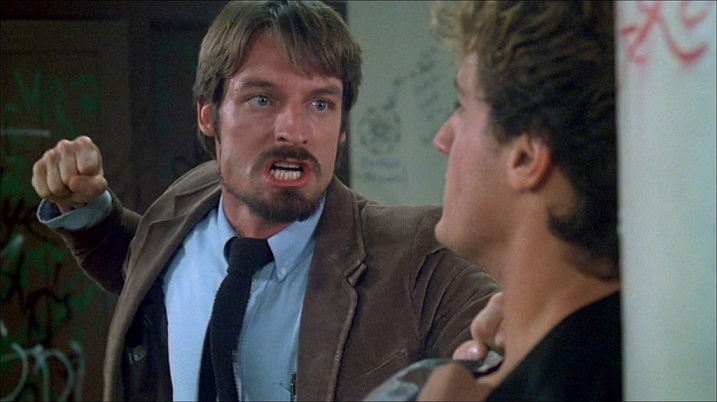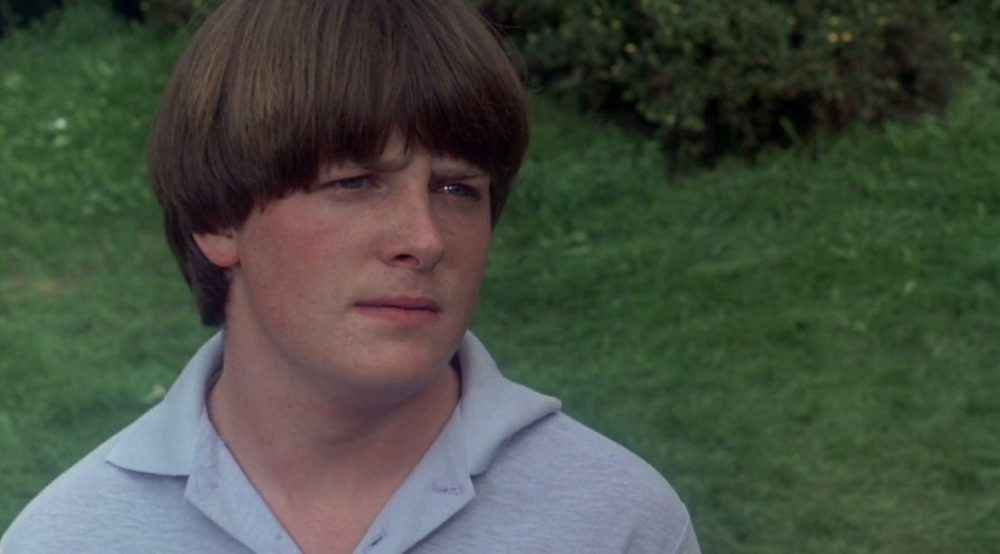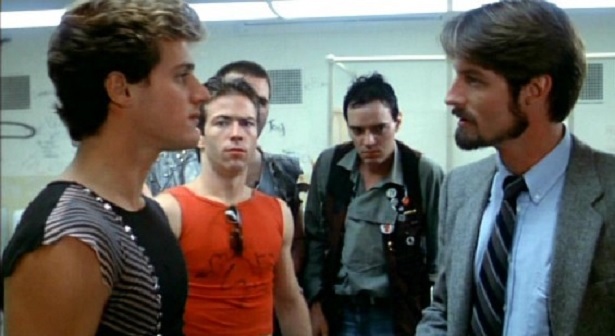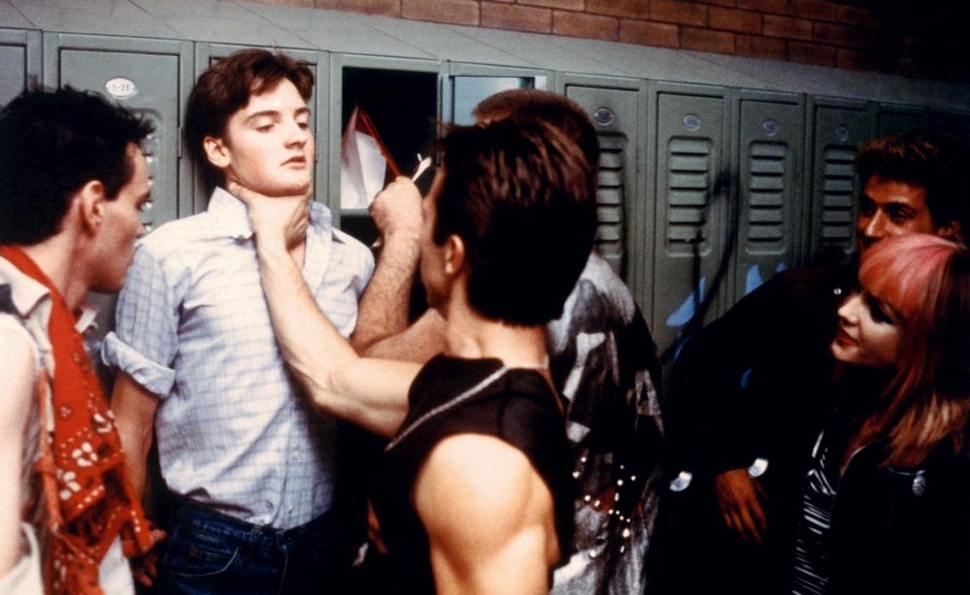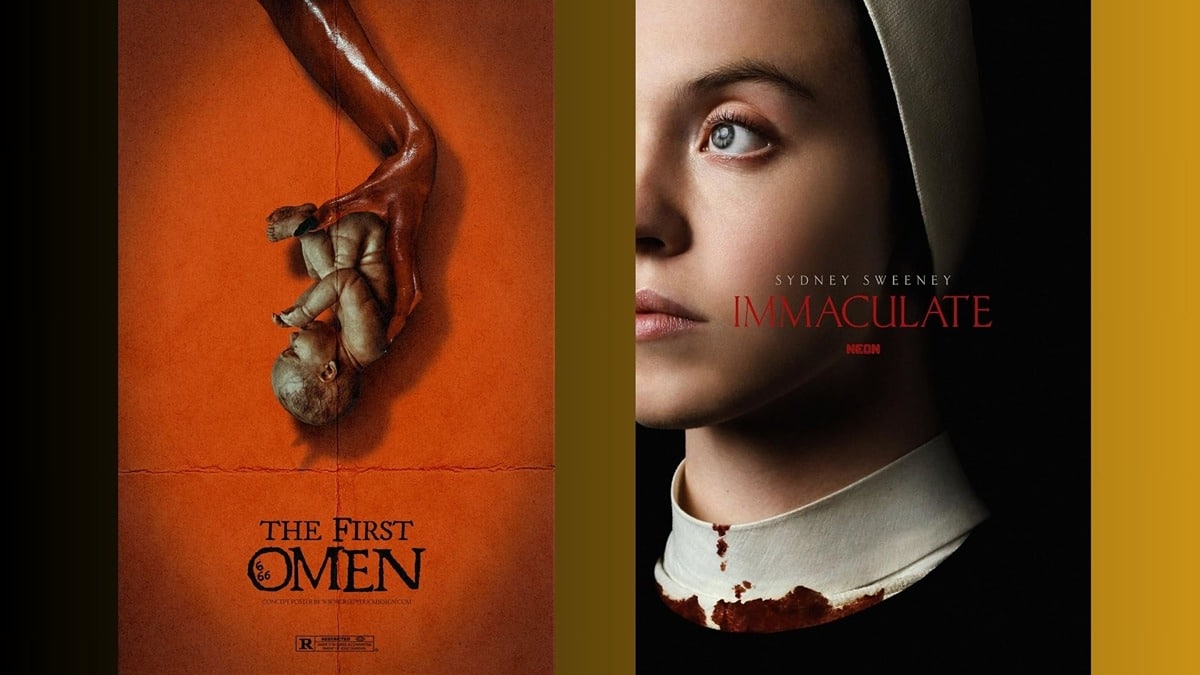The Beat’s Gregory Paul Silber has been accused of having a bit of an… obsessive personality. Each week in Silber Linings, he takes a humorous look at the weirdest, funniest, and most obscure bits of comics and pop culture that he can’t get out of his head.
Last week, I kicked off Teacher Appreciation Week by having teacher and fellow contributor to The Beat Ricardo Serrano Denis join me for a discussion of the cult classic student-teacher revenge thriller Class of 1984. It was a great chat, but I still wanted another teacher’s perspective on this ridiculous movie about juvenile delinquency, highly questionable disciplinary techniques, and young Michael J. Fox‘s terrible bowl cut.
That’s why I’m closing out Teacher Appreciation Week and leading into Mother’s Day with an EXCLUSIVE interview with one of my favorite people in the world: my own mother.
My mom teaches middle school language arts at an urban district in New Jersey, not far from the New York City high school where Ricky teaches social studies. But unlike Ricky, my mom has never been a fan of the kind of media I tend to write about, like comic books, horror, or violent revenge flicks like Class of 1984. That’s not to say she doesn’t support my writing, because she certainly does, just that she probably isn’t going to read that issue of Swamp Thing where he has sex with his human girlfriend anytime soon.
I thought it would be a fun experiment to have my mom watch Class of 1984 and give her perspective as a hardworking, ethically-minded teacher who would never use guns as an instructional tool, destroy a student’s car, or burn a student alive… just to name a few examples from this utterly wild movie.
Happy Mother’s Day, Mom! I hope you can forgive me.
Gregory Paul Silber: So what did you think of Class of 1984?
Mrs. E Silber: I did not think it was terrible. I was entertained by it. I would not watch it on my own, but… I didn’t get that bored watching it or that freaked out.
Greg: Did you expect to be bored?
Mrs. Silber: I expected more of a horror movie. More like… what was that movie with Sissy Spacek? More like that.
Greg: Carrie?
Mrs. Silber: Yeah. I mean, I guess it’s similar.
Greg: Well both are revenge movies. So let’s start with the positives. What did you like about Class of 1984?
Mrs. Silber: I’ll say the positive and the negative at the same time. I thought most of the acting was pretty decent. There were a lot of people that turned out to be big stars. Some of it was a little over the top. I didn’t like the punk aspect of it because to me that wasn’t relatable. Like that’s pretty much my generation, and the people who were the punk people would not have been the badasses.
Greg: Let’s expand on that a little bit. When you say they wouldn’t have been the badasses, do you mean they wouldn’t have been bullies? Or would they have been bullied?
Mrs. Silber: I think the punk people would have been more of the bullied than the bullies. I mean, I’m a few years older than that. The movie was made in ’82. I graduated in ’79. So it’s pretty much my generation. It’s not that far off I guess.
Greg: No, no not at all.
Mrs. Silber: But the punky people I remember, or even when your uncle was in school because that’s his age exactly… were more on the sidelines. They might have had a “I hate school” persona, but they weren’t the ones bullying the whole school. So I just thought, like, the way they were dressed… seemed a little bit weird. It’s also something that years later was almost comical. Timothy Van Patten’s character [Peter Stegman] kind of reminded me of, oh, what’s his name from Saturday Night Fever?
Greg: John Travolta?
Mrs. Silber: Yeah, to me he was almost the exact same as John Travolta from Grease [laughs].
Greg: Well, it’s funny that you bring up Grease, because something that I spoke to my colleague Ricky about when we were discussing this movie was the sort of moral panic that Class of 1984 represents. I’m saying this is someone who was born in 1991, but it feels kind of ’50s. You know, parents being scared about kids being corrupted by sex, drugs, and rock and roll.
Mrs. Silber: But I think that was a big thing back then.
Greg: You mean in the ’80s?
Mrs. Silber: In the early ’80s, parents were still scared of the sex, drugs and rock and roll. Because our parents were the ’50s people.
Greg: I should say for readers that you were born in ’61.
Mrs. Silber: Right. Even the early ’60s were more like the ’50s and the ’60s didn’t really become the ’60s until like ‘68. So yeah, they were definitely more uptight. They’re the ones who saw the ’60s and ’70s. We were brought up by people who were against all of that.
Greg: Like you said, it’s obviously, for many reasons, not a realistic movie. It’s very over the top. But it does seem to speak to what was going on, the cultural zeitgeist at that time with what people were afraid of in terms of the young people, the youth culture, things like that. What do you think of the movie’s politics?
Mrs. Silber: I don’t remember the movie’s politics. Tell me something about the movie’s politics.
Greg: I don’t mean anything as direct as telling you to vote for Reagan or something. You were there at the time and I was not, but my understanding is that in the ’80s there was a resurgence of a certain kind of political thought where politicians like Nixon and Reagan were kind of telling you the cities are so dangerous, the youth are so dangerous, the music they listen to is so dangerous.
Mrs. Silber: I think that’s true. But I did read a little about the movie, and one of the reasons why the writer wrote it was to warn people what schools were becoming. I used to work in one of the most difficult middle schools in New Jersey, the biggest middle school in New Jersey. Not that I would ever bring out a gun, but–
Greg: [Laughs] Of course.
Mrs. Silber: I could relate to the feeling that nobody was listening to him, and how frustrating it was. I could relate to the fact that the administrators had no control over the school and the frustration that both the band teacher and the science teacher felt that they were trying to teach and these kids were disrupting the class.
Like when the gang leader came in. Before he started playing beautifully, he was banging on the piano, totally disrupting the class. I’ve had that situation, that frustration, where it’s just a few kids who make it absolutely impossible, and there’s nothing you could do. It takes everything in your power not to lose it like he lost it in the movie. It’s very frustrating. I wrote down a line because I took some notes–
Greg: I love this, thank you.
Mrs. Silber: The Perry King teacher character said to his wife “there are a lot of good kids here, but the bad ones take so much of our attention.” And I used to say that so many times at the middle school. We had like 1800 kids at one point. Maybe at the most, 200 were “bad.” Probably more like a hundred, but they just took over the whole school and you could see the transition between September and by Thanksgiving. More and more kids became troublesome because those hundred who walk in the door at the beginning of the year got away with so much stuff that so many other kids started following it. You just had no control. It affected everybody in the school. The majority of the kids who aren’t “good” kids would have been good kids. It just got taken over, which is one thing when you talk about in urban education.
You know, I could be defensive about what people say about teachers at urban schools. But they were not really exaggerating that much. Were they raping teachers’ wives? No, I don’t know anybody who did that. But were they attacking? Were they walking in and totally ruining classes?
My last year at the middle school, my lock didn’t work in my classroom. I would have gang kids just walk into my class because they were after other kids. And there’s nothing you can do about it. Or when kids just refuse to do anything and want to totally take over and disrupt the class. That happens and people don’t realize it. And then people say, “call the parents.” But if the parents have no control of the kids and don’t care, there’s not much you can do. The bullying of the kids, and taking over the hallways and the bathrooms… those things happen and have happened. That was my life. Was it a little bit over the top? It was, but not that much. I think the point of the movie from what I read about the guy who wrote the movie, was to show what’s happening in the schools. It’s almost dystopian. “What could happen if things are allowed to continue?”
That being said, how the band teacher handled everything from the beginning was totally wrong. I’ve seen teachers come in, young teachers like that, thinking they’re going to be able to fix something like he did. He came in and was telling the principal what to do, and the other teachers what to do. He thought, “oh, if I talk nice to these kids” or “if I talk tough to these kids” or whatever, he thought was going to change it. I’ve seen that happen. It’s really obnoxious and annoying.
Greg: So you think he was a little naive?
Mrs. Silber: I think he was naive and I think he was arrogant. He didn’t really understand the dynamics. He didn’t understand what was going on. I realize this is a fictional movie, but… to go to the student’s house when he was already under investigation for assault. I mean, how wrong was that? Or when he got out of the car to fight them. I know he saw the Michael J. Fox character being harassed, but that’s just stupid. He thought he was going to fix the school just by… being more tough. It wasn’t going to work. And it didn’t work, obviously [Laughs]. And then, of course he lost it, and you know how violent they got.
Greg: I want to talk to you about that scene you brought up, when the lead bully barges into the classroom. There’s this moment where you find out that he plays the piano beautifully. I kept thinking things might’ve gone differently if the teacher was more encouraging.
Mrs. Silber: How he handled that was so wrong! The guy was obviously a gifted piano player. He asked to stay, and was told no. As a teacher… first of all, you can’t do that. And second of all, you gotta keep them in the class. You can’t kick them out. But he could’ve reached him through his music by complimenting him. I mean, yeah, the psychology is that people are bullies usually because there’s something going on in their life. And we later learned that his father died. But it could have been totally different if he had been allowed to stay, and made a big deal of the fact that he reached him on a musical level. Although I do have to question the fact that the whole group was in band because come on, how many tough guys are in band class?
Greg: [Laughs] Well, I think I think it might have been the Michael J. Fox character who said something about how the other kids in his gang were not supposed to be there, but that Timothy Van Patten was.
Mrs. Silber: If he had let him stay and play in the band, maybe he could reach out to the mother by phone and say “hey, your son is gifted, he has a chance here of making this a career, but he’s doing X, Y and Z. Let’s work together and figure out why he’s doing it. Is there a way I can reach him?” He’d learn what was going on. He’d have learned the father died.
Now that I think about it, the whole thing was a power play between him and this kid. I always have to remind myself that when you’re in a power position with the kid, you’re not going to win. We all get to it on some level. But, you know, they need to save face. The teacher is not going to win in a power play against a kid. I’ve learned the hard way, too: you being the tough, mean teacher for that type of kid is just not going to work. All it does is ruin it for everybody else. It makes them scared.
Greg: Something that was making me uneasy, until I found out maybe this was intentional, is that the teachers in this movie don’t really seem to regard these kids as kids. Obviously it goes to the extreme at the end where he fights that gang to the death. But there doesn’t seem to be a whole lot of consideration for the fact that these are literally children.
E. Silber: The blond guy, I can’t think of his name, he kept saying, “I’m just a kid.” But at the end, if you remember, the teacher did go to try to save him, and [Peter] went to slice his hand off. So there’s obviously something deranged about this.
Greg: It’s interesting because for me, it’s like, what message about the youth is this movie trying to explain? On my first viewing, I kind of took it as face value, as if the movie was saying kids are dangerous. And from talking to you and talking to Ricky, it seems like both of you are suggesting that… I don’t know if satire is the word, but that the movie may be trying to satirize the way people look at teenagers. Like everyone thinks that they’re so wild and crazy, but maybe we’re not thinking enough about the fact that they’re literally children.
Mrs. Silber: You have to think of what’s causing people to act like that. You have to think about the whole education system in general. What are you expecting, and what are the expectations of a school district in terms of dealing with things. But it seems like everybody was scared of that gang. I don’t think it’s coincidence that they said that this kid’s father died. And that he’s a gifted pianist. Because at some point he wasn’t the way he is. No matter how gifted you are naturally, you have to sit down and practice and sit for a lesson. That didn’t just happen. Was anybody giving the kid counseling? Did they ask for counseling prior to getting as crazy as it was? And the people who are following him and all of that. That’s a whole other issue.
The principal and everybody was just trying to survive. Even the security guards were just trying to survive. It’s the satire of “this is what will happen if things are allowed to get that way.” It’s an inner city school or whatever, but this could happen in every school, with every kid. So why is that happening?
Another thing I didn’t like was how the teacher was trying to pressure Michael J. Fox to give up the names. You just know that’s not going to happen. It has to be anonymous. If you know enough about schools, you know that if you give up the name of a person who did something, there’s going to be payback.
Oh, you were talking about political. I didn’t notice in the beginning, but Dad was saying that every time there was a fight, the white guys always won the fight.
Greg: I don’t know how much of this you noticed – I’m sure you know some of it – but the main gang were basically Nazis. They did the salute. I think one of them wore a swastika. You may have noticed some swastika graffiti. We see them getting into a brawl with a Black gang. But the Black gang was never really shown doing anything explicitly bad. The first thing we see is [the main gang] shoving a Black kid into a bathroom and basically committing a hate crime. Later after school, they get into a fight. They leave the Black gang wounded on the ground, and the police come by and just pick up all the Black kids like they’re not even concerned about the white kids who beat them up.
Mrs. Silber: Now that I’m thinking about it, that scene in the bathroom where Michael J. Fox and the other guy that ended up dying were buying drugs. He wanted to catch them buying drugs, but he let those two go because in his mind, he perceived that they’re the good kids. But the fact was they were buying the drugs! And then the guy ended up dying. Didn’t he have any responsibility to follow up on, “well, why are they buying drugs?” They just ignored it. He was so fixated, so biased.
He didn’t show any desire to try to work it out. He just looked at them like they were the enemies and shouldn’t be here. And he got mad when he had to do hall duty. Teachers have duties! We don’t only teach!
I could relate to the teachers though, like when the older teacher was feeling like a failure. That frustration. You feel like you’re just not getting through, and you have to deal so much with discipline. It does take over. Sometimes that’s it. The younger teachers quit and the older teachers get tired, burnt out. Something does have to be done about all these problems in schools.
Taking it one more level, when… what’s his name? The Facebook guy?,
Greg: Mark Zuckerberg.
Mrs. Silber: Yeah. He gave $100 million to Newark schools. The whole thing got me so angry. First of all, nobody knows what happened to that money. He wanted to use it, A, for technology, and B, to give it towards teacher incentive for kids’ progress, which is just showing how much nobody understands what’s going on. If I ever had an extra $100 million to give to a school district, first of all, I wouldn’t give it all to one district. There’s a lot of urban schools in New Jersey. But I would have used it to hire more counselors because that’s what they need, what we need. That’s what everybody needs, is more counselors and more therapy.
Greg: It’s almost like a prison movie in some ways, isn’t it? Ricky was comparing it to a Western, but it really felt like they were treating the school like a prison with all the inhumanity that comes from being imprisoned.
Mrs. Silber: I think a lot of people feel that school is a prison.
Greg: [Laughs] Well, sure. That goes back God knows how many decades or centuries.
Mrs. Silber: Schools are made for a certain type of person in America. I’ve been saying it for years. Everything about it, from a teacher evaluation, on down to the kids’ grades and how they behave, is based on this conception. My evaluations are all based on what the kids did. “Did kids ask questions? Do kids help the other kids? Do the kids participate?” Which is why when I was at the middle school, the teachers that got the “highly proficient” were the ones of the gifted and talented and advanced classes. Every year. They had discipline and we had to applaud them.
Are those kids so brilliant, or did they just do the right thing? They know how to behave in school. They were the square peg in the square hole. So the kids who are the square peg in the circular hole always are an issue and it evolves from there. You can do a whole commentary on the American school system’s expectations.
Greg: Something that was interesting to me was the way that the movie depicted the not-gangster kids. Other than that gang, pretty much every other kid in that class is a perfect angel. But there is this question that the movie doesn’t really address, like you’ve been talking about, with those kids who are in between. They’re not going to be the “gifted and talented” kind of kids. And they’re not complete delinquents, but they’re struggling between multiple worlds.
Mrs. Silber: Yeah, it influences everything. Those kids get influenced both directions.
Greg: You mentioned that the leader of that gang’s father died. What did you think of the brief scene we saw with his mother?
Mrs. Silber: To show up when there was already an assault charge against him, and to think that he’s going to talk to the mother with the kid sitting there. I’m sure the mother knew at that point what the kid’s been like. Did he expect that the mother was going to side with the teacher? Right then and there?
Greg: We got a few scenes where he’s endangering other people around him by not thinking about the ways he’s trying to help.
Mrs. Silber: He lost me, and I think any sane person, when he took the kid’s car and crashed it. That is just ridiculous. You knew that was going to be payback for that! Who does that? It’s one thing in the moment to get in a fight with a kid, a verbal thing. But to go take someone’s car and purposely break into it and crash it? He was totally irrational at that point. It was presumptuous. He’s lucky he still had a job.
You know, I had to agree with the principal in the scene where they found the coke or whatever drug it was in the bathroom floor trying to pin it on those guys. You don’t barge into a bathroom and say “aha, you’re here!” Plus there are cameras around schools. There are ways to have found this out, or look to see what’s happening. You can get Michael J. Fox and the other kid as they’re walking out, pull them aside, do a drug test, and make them privately tell you who gave it to him. But don’t do things so obviously. I mean, it’s a movie, but that part was stupid.
Greg: I think that’s a good place to transition into talking about it more just as a movie, because obviously it’s very silly. And there’s a ton of things that are, surely on purpose, not very plausible. You mentioned that you liked some of the performances. Who did you think were standouts?
Mrs. Silber: I don’t know. I just didn’t hate it. I did think the guy who played the lead played it very over the top. But, you know, the rest of it… they’re good actors. Roddy McDowall, Perry King. Obviously Michael J. Fox. The principal was fine.
Oh, another stupid part of the movie was when the teacher was running out from the concert and nobody followed him? Are they just waiting for him to come back? You wouldn’t think to follow and see where he is, running around a school that has cameras in it? I mean, come on.
Greg: We wouldn’t have had the kind of bloody finale that the filmmakers clearly wanted if this happened. Obviously he was upset because his wife was in danger. But the logical thing for him to do would have been to go to the principal and say, “hey, I just got this note that my wife has been kidnapped. I’ve got to go.”
Mrs. Silber: I get running out. But you would think that somebody would have run after him. Interestingly, I read that the original ending was supposed to have the kid committing suicide.
Greg: I actually didn’t know that.
Mrs. Silber: And audiences didn’t like it. So they filmed the scene with [Perry King’s character, Mr. Norris] pushing him.
Greg: Wow. That would have been a completely different thing.
Mrs. Silber: Yes, it would have been. The kid was obviously crazy by the end where the teacher is trying to help him. The teachers show him humanity, and then the blond guy tried to slice his hand off. Maybe they were trying to make some point about mental health or whatever. What is it they say? Brilliance and insanity are closely connected or something?
Greg: I don’t know.
Mrs. Silber: I think the teacher just didn’t address how gifted he was. That’s either stupid or naive or whatever. I mean, obviously it was put in the movie for a reason.
Greg: What do you think might have been different if they were to make a remake and call it “Class of 2023” or something today?
Mrs. Silber: I don’t know. Obviously, some modern technology would have to be in there. I don’t know other than that. I mean, I guess what you’re saying about the one group taking over I don’t think a school that big would just have one group being so bad. I don’t think it would be so contained. That’s just Hollywood. I don’t know, I mean hopefully there’s more training. I don’t think you can have the same movie now.
Greg: Class of 1984 really does feel like a product of its time doesn’t it.
Mrs. Silber: Yeah. Again, I don’t understand why they made them punk. I don’t know, as I said I’m a little older. Was that trying to prove that punk music made people crazy? I don’t know.
Greg: I mean, Nazi punks were certainly a thing. I know you’re not into punk, but have you heard of the band Dead Kennedys?
Mrs. Silber No.

Greg: They’re a famous punk band from the early ’80s, so they would have been popular at the time among punks. They had a song called Nazi Punks Fuck Off. It’s about, well, what it sounds like. Nazi punks would come to their shows sometimes and they didn’t like them.
But there is this division between what mainstream thought punk was and what the movement actually represented. Punk ideally is supposed to be about, you know, inclusivity, and taking down the establishment. Whether you like the music or not, it’s this idea of breaking down societal barriers to create a better world. I think to most people, or at least people who raised me like you did, more liberal people, that’s a good thing. But because of the harshness of their presentation, there was this image that they were scary, dangerous people who were corrupting your kids. But you were saying, the punks that you knew growing up kept to themselves more. And true to the origins of the term, were the social outcasts, not the ones trying to create their own hierarchy within the school.
Mrs. Silber: Going back to what you were saying about what the adults thought of drugs and all that, the fact that he just kept thinking that Michael J. Fox and his friend were innocent when they clearly really weren’t innocent…
Greg: Well, people are fooled by appearances, right?
Mrs. Silber: That idea that the punk people are the bad people, that’s what they definitely thought back then. I think a lot of people still think it. That’s a problem.
Greg: Would you recommend Class of 1984 to other teachers?
Mrs. Silber: [Laughs] I don’t think any of my friends would appreciate it. I don’t think I’d go out of my way to say “watch this movie!” It was a little stressful because in certain parts of the movie Dad was like, “oh, this is so stupid.” But I was like “you know what, I’ve seen it happen. I’ve kind of lived this.” It wasn’t so stupid, when you’ve come from a situation like I came from. I think it would be good for you to have a teacher who is from a suburban school watch it to see the reactions. I don’t know if you have time for that.
Greg: What are some movies about teachers that you would recommend people watch for Teacher Appreciation Week? They don’t even specifically have to be about teachers, but something that speaks to the plight of teachers.
Mrs. Silber: Room 222, which was a TV show back in the day. The White Shadow, which probably had a lot of political things going on now that I think about it. Welcome Back, Kotter, where they were dealing with urban schools and they actually got along with the kids! I’d have to look at them again to see how they held up over time. But I think those show better handling of the kids in inner city schools. To Sir with Love also, the old school one.
You know I love the movie Freedom Writers, I show it to our kids a lot. But the reality is, I think you have to think about the whole white savior thing. I like Freedom Writers to show my students, but there’s a lot of criticism of it because of the white savior concept. Also if you look at her reality, she did it for one year and left. Her marriage got ruined in the meanwhile, and she took out two part time jobs. When it was being held up as an example of what you can do in an urban school, it was a little bit insulting to the reality of what’s going on. She had some good ideas, but they didn’t hold up over time. She didn’t stay long enough for it to hold over time, and she gave up a lot of her own money to do all of that. I mean, that was a true story. So she did it, but you have to look at the reality.
Greg: It has a complicated legacy.
Mrs. Silber: Yeah. I mean, all teachers spend a lot of money in the classroom. It makes you wonder how much can be expected. Wait, what was your original question?
Greg: Well it’s Teacher Appreciation Week and–
Mrs. Silber: Oh, Lean on Me! About the guy from Paterson. I love that movie. That’s the way to go. But he took some really violent steps and got a lot of criticism for how violent he was. Like, he didn’t let kids in the building if they were doing certain things. He would lock the doors. But he got things under control in real life. That’s a real life story. If you want things to change, there has to be change. And you can’t compare an urban school to a suburban school. There’s a lot of controversy about what he did, but he made progress… oh, and Stand and Deliver. About the math teacher. That one’s also true.
So that’s what I would watch. And then I’d go old-school. Room 222 and Welcome Back, Kotter.


